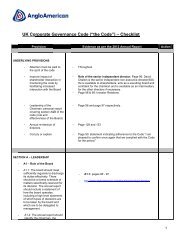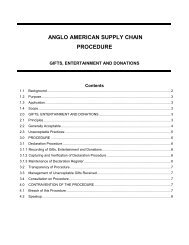pdf [ 1.5MB ] - Anglo American
pdf [ 1.5MB ] - Anglo American
pdf [ 1.5MB ] - Anglo American
You also want an ePaper? Increase the reach of your titles
YUMPU automatically turns print PDFs into web optimized ePapers that Google loves.
Scaw Metals Group Sustainable Development Report 2005 41<br />
Summary of Group HIV/AIDS Targets and Performance (South African Operations)<br />
Targets 2005 Performance 2005 Targets 2006<br />
Increased voluntary counselling and testing (VCT) so that 50%<br />
of employees tested during 2005.<br />
Ensure wellness programmes established for all HIV employees.<br />
Extend partnerships with local government and NGO’s to<br />
assist with HIV in communities associated with Scaw.<br />
71% of employees tested.<br />
85% of known HIV cases on wellness programmes.<br />
Continued success with ground breaker programme.<br />
Failure of love life programme to extend partnership<br />
with local government clients.<br />
70% of all employees to be tested during 2006.<br />
95% of known HIV cases on wellness programmes.<br />
Through the group VCT programme, monitor and prevent<br />
new cases of HIV infection in employees whose status is<br />
known.<br />
Milestones and Achievements<br />
The significant uptake of voluntary counselling and testing<br />
(VCT) by employees at South African factories in 2005 was<br />
gratifying. The number increased from 32% in 2005 to 71%<br />
in 2006. Included in the latter figure is the number of known<br />
HIV-positive cases, which at the beginning of 2005 was at<br />
6% and who have not been retested. The cause of this<br />
turnaround is due to a number of factors, but it is felt that<br />
two new initiatives made a major impact:<br />
• Testing was taken to the employees at their worksites<br />
by a nursing sister who set up HIV and AIDS testing<br />
equipment in an office or meeting room in that area.<br />
• HIV and AIDS was made a key performance indicator<br />
for management, thereby prompting greater managerial<br />
involvement in the programmes.<br />
World AIDS Day on 1 December and the week in which it<br />
was held was again targeted for the dissemination of<br />
information, lecturing to groups, engaging with employee<br />
representatives, the erection of banners at each factory,<br />
the burning of candles in memory of those who have died<br />
of HIV and AIDS, as well as a variety of other HIV and AIDS<br />
focused measures. This approach will continue to be<br />
implemented each year.<br />
A few employees have come forward and openly declared<br />
their HIV status. This has been a positive development in<br />
the group’s attempts to destigmatise the disease. These<br />
employees have come forward to assist the clinic sisters,<br />
shop stewards and other employees with HIV and AIDS<br />
programmes. One of the employees, Geddys Nala,<br />
appeared on the cover of the September 2005 issue of<br />
NUMSA News, the newspaper of the National Union of<br />
Metal Workers, one of the biggest unions in South Africa.<br />
Excerpts from an interview with Geddys, conducted with<br />
the Scaw Metals HIV/AIDS co-ordinator, Ruth Mani, were<br />
published inside (see Case Study 1).<br />
Review of 2005<br />
The HIV/AIDS programme continues to be based on three<br />
pillars which include:<br />
• Voluntary Counselling and Testing (VCT)<br />
The success in getting employees to come forward to be<br />
tested to “know your status” has been mentioned above.<br />
This turnaround in employee attitude needs to be cemented<br />
to ensure that testing and annual re-testing become a<br />
routine matter. There is now a greater drive to perform these<br />
tests throughout the year and not only during special events,<br />
such as World AIDS Day. This means that nursing staff are<br />
able to have more contact time with employees, promoting<br />
better pre- and post-test counselling.<br />
When an employee has been diagnosed as being HIVpositive,<br />
he or she is automatically placed on the “wellness<br />
programme”. A blood sample is sent to an outside laboratory<br />
to confirm the HIV status and at the same time a CD4 count


![pdf [ 1.5MB ] - Anglo American](https://img.yumpu.com/34179502/43/500x640/pdf-15mb-anglo-american.jpg)
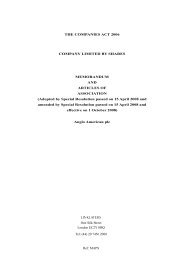
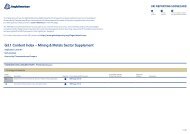
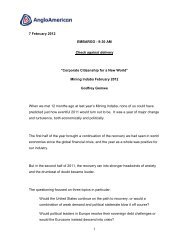


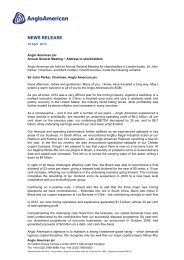
![English PDF [ 189KB ] - Anglo American](https://img.yumpu.com/50470814/1/184x260/english-pdf-189kb-anglo-american.jpg?quality=85)




![pdf [ 595KB ] - Anglo American](https://img.yumpu.com/49420483/1/184x260/pdf-595kb-anglo-american.jpg?quality=85)
![pdf [ 1.1MB ] - Anglo American](https://img.yumpu.com/49057963/1/190x240/pdf-11mb-anglo-american.jpg?quality=85)
